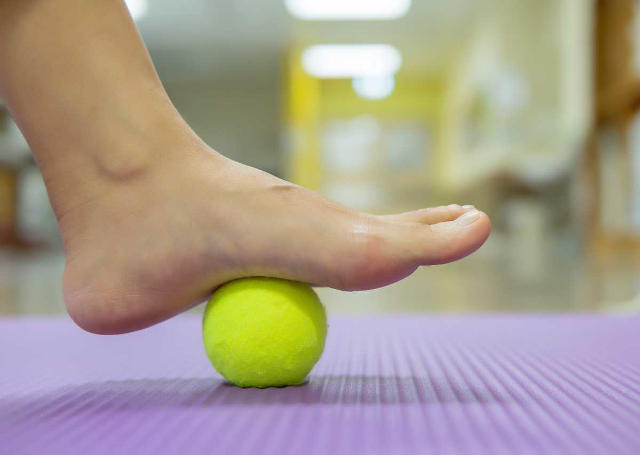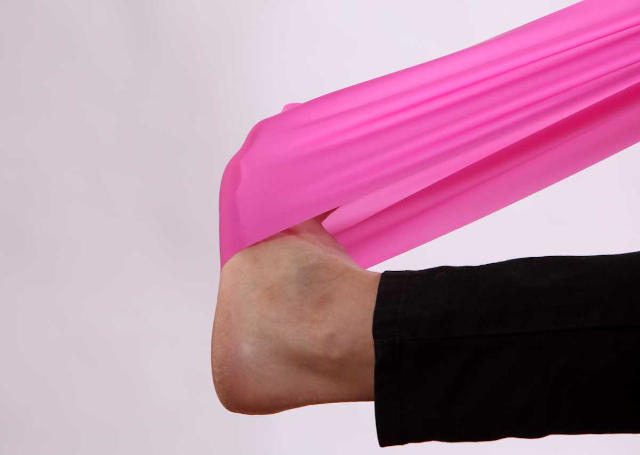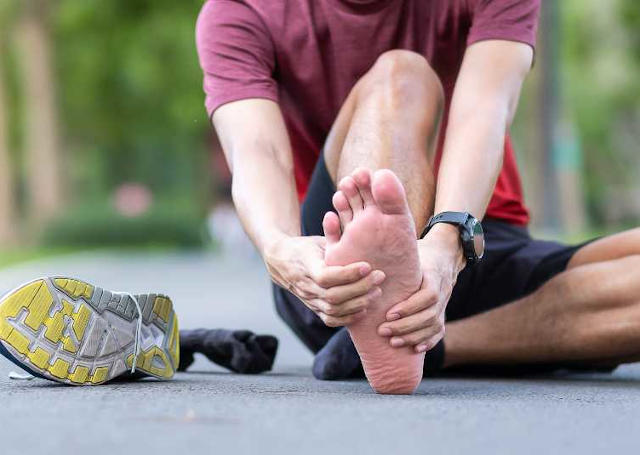What is the treatment for Heel Pain caused by Plantar Fasciitis?
For someone who has run every inch of Cork I am familiar with heel pain. However, it is not just a condition suffered by runners, heel pain, caused by damage to the plantar fascia, is very common and can arise for a variety of reasons. While there is no immediate cure there is plenty you can do to help ease the symptoms of plantar fasciitis. These include preventative measures ranging from the correct exercises to using custom orthotics.
Our feet are complex and pretty amazing. The foot has 26 bones held together by 33 joints and supported by ligaments, tendons and muscles. Even when you are not running or walking your feet are working hard to support the weight of your body and keep you standing up. The plantar fascia is a thick band of tissue that runs along the sole of the foot and each time the foot hits the ground it acts like a shock absorber. When it becomes inflamed or damaged it causes pain which is often felt in the heel and arch of the foot. It is often most painful in the morning, making it very painful to walk on first thing. There are exercises you can do at home to help relieve the pain of plantar fasciitis, but in most cases there is a biomechanical deficit in the foot that needs to be addressed with the help of an expert clinician that deals with these issues.
What are the causes of plantar fasciitis?
- High level of activity - exercising a lot and in particular running can lead to injury of the plantar fascia
- Flat Shoes - wearing shoes that do not have support, either for walking or running, are hard on your feet
- Poor foot/ankle function - fallen arches or high arches, abnormal gait and having tight Achilles tendons or calf muscles are all factors that can disrupt the plantar fascia
- Daily activities - the simple activity of walking on hard footpaths (combined with poor footwear) can cause damage
- Overweight - carrying excess weight puts pressure on the plantar fascia leading to micro-tearing and scar tissue formation
- Age - the plantar fascia deteriorates over time and the condition is most common in people over 40 years old. However cases are common in highly active younger individuals/ athletes/ dancers etc
Some tips to help you treat plantar fasciitis at home.
Stretch out your foot
- Sitting in a chair, draw your foot up on top of your other leg
- Holding your upper foot and toes, pull towards your shin, creating a stretch in the arch of your foot
- Using your free hand, hold the area under your foot and feel the tension in the plantar fascia
Rolling stretch for foot
Using a tennis ball, or a tin or a foam roller
- sit tall on a chair
- roll the ball/tin/roller under the arch of the foot gentling massaging the plantar fascia
- roll for 2 minutes
Stretch your calf muscles (tight calf muscles may contribute to plantar fasciitis)
- Press your palms against a wall
- Straighten the affected leg and bend the other knee in front
- Ensure both feet are flat on the ground
- Feel the stretch in the calf and heel of the extended leg
- hold the stretch for 10 seconds
- repeat two/three times each day

Stretching the plantar fascia
- use a towel around your upper foot and pull towards you
- hold for 10 seconds
- repeat three times
Foot flexes
- sit on the floor with legs straight
- wrap the elastic band around your foot, holding the ends in your hands
- gently point the toes away from the body
- slowly return to starting position
- repeat 10 times

As a life-long runner I always ensure that my running shoes are giving me the support I need and that I replace them when needed. Be sure to do the same, not just with your running shoes but with your everyday footwear.
If plantar fasciitis symptoms persist and you would like to get some expert advice please contact us to book a consultation. We can provide the appropriate treatment to help relieve your heel pain and if you require orthotics we can scan your feet using the most up-to-date digital gait scanner to make sure that you get the best orthotics for your feet.

